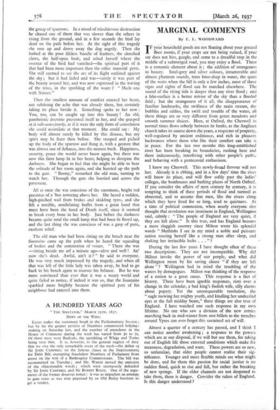MARGINAL. COMMENTS
By E. L. WOODWARD
IF yoUr hon.. iehold goods are not floating about your ground floor rooms, if your crops are not being ruined, if your car does not hiss, gurgle, and come to a dreadful stop in the middle of a submerged road, you may enjoy a flood. There is a romantic element about it ; the addition of strangeness to beauty. Steel-grey and silver colours, innumerable and almost phantom sounds, trees knee-deep in water, the quiet of the weirs when the fall is only a few inches, most of these signs and sights of flood can be matched elsewhere. The sound of the rising tide is deeper than any river flood ; and a lake-surface is a better mirror of the sky than a flooded field ; but the strangeness of it all, the disappearance of familiar landmarks, the swiftness of the main stream, the bubbles and eddies, the swirl and trouble of the water, all these things are so very different from green meadows and smooth summer sluices. Here, at Oxford, the Cherwell in normal times flows soberly between its banks, as the Anglican church takes its course down the years, a respecter of property, well-regulated by ancient ordinance, and rich in pleasant backwaters where those who like their comfort can take it in peace. For the last two months this long-established river has been breaking its boundaries, rushing here and there indecorously, interfering with other people's paths, and behaving with a Pentecostal enthusiasm.
I know my Cherwell. This newly-found fervour will not last. Already it is ebbing, and in a few days' time the river will know its place, and will flow softly past the ladies' colleges, the boathouses and bathing places of North Oxford. If you consider the affairs of men century by century, it is tempting to think of these periods of flood and turmoil as abnormal, and to assume that men, like the rivers along which they have lived for so long, tend to quietness. At a time of political commotion, when nearly everyone else thought that revolution was imminent in England, Wellington said, calmly : " The people of England are very quiet, if they are left alone." Is this true, and has England become a more sluggish country since Milton wrote his splendid words " Methinks I see in my mind a noble and puissant nation rousing herself like a strong man after sleep, and shaking her invincible locks . . . " ?
During the last few years I have thought often of these two descriptions. They are not incompatible. Why did Milton invoke the power of our people, and what did Wellington mean by his saving clause " if they are left alone " ? Wellington had in mind the troubling of the waters by demagogues. Milton was thinking of the response of a nation to a great cause. This response is a fact of history. There have been ignoble responses, riots over a change in the calendar, a bad king's foolish wife, silly alarms about popery. Yet the , unconquerable resolution, the " eagle mewing her mighty youth, and kindling her undazzled eyes at the full midday beam," these things are also true of England. I have watched one such response in my own lifetime. No one who saw a division of the new armies marching back in mid-winter from rest-billets to the trenches around Ypres can ever forget this sustained act of will.
Almost a quarter of a century has passed, and I think I can notice another awakening ; a response to the powers which are at our disposal, if we will but use them, for taking out of English life those external conditions which make for meanness, degradation, and want. These powers are so new, so unfamiliar, that older people cannot realise their sig- nificance. Younger and more flexible minds see what might be done, and for them this passion for social justice is no sudden flood, quick to rise and fall, but rather the breaking of new springs. If the older channels are not deepened to take them, there is danger Consider the rulers of England. Is this danger understood ?










































 Previous page
Previous page